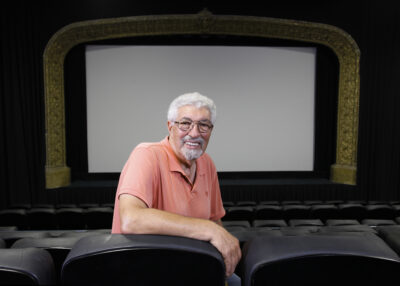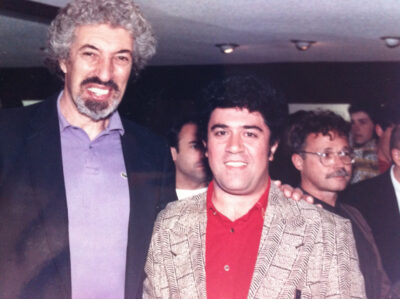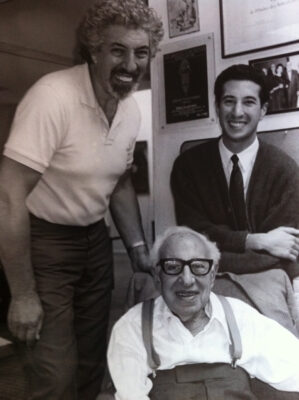A huge hit last weekend in New York, we’re excited to open the comedy Bad Shabbos this Friday at the Royal and Town Center with expansion runs planned around L.A. County in the subsequent weeks. The film follows David and his fiancée, Meg, who are about to have their parents meet for the first time over a Shabbat dinner. Things get far more complicated because of an accidental death (or murder?). With Meg’s Catholic parents due any moment, the family dinner soon spirals into a hilarious disaster.
The following Bad Shabbos screenings will feature in-person introductions or Q&A’s: Thursday, June 5 at the Royal w/director Daniel Robbins, producer Adam Mitchell & star Theo Taplitz, moderated by Hilary Helstein; Saturday, June 7, Town Center 5:15 P.M. with Robbins & Taplitz & 7:30 P.M (introduction only).; Royal 7:30 P.M. w/Robbins & Taplitz; Sunday, June 8, Town Center 1:00 w/Robbins & 3:05 P.M. (intro only); Royal 3:05 and 5:15 P.M. w/Robbins.
Bad Shabbos director Daniel Robbins is interviewed on the latest episode of Greg Laemmle and Raphael Sbarge’s video podcast Inside the Arthouse and also wrote the following about his film:
“My grandfather liked to joke that Christians will tell you they’re Christian, Muslims will tell you they’re Muslim, but Jews will tell you they’re Jew…ish.
“There’s a wide range to Judaism and the characters in this film fall in the middle of the spectrum. They’re people who take their faith seriously, but also interact with the secular world. People who, instead of planting their flag on one end of the spectrum, try to exist in between. People who try to manage the polarities of a secular life and a religious one.
“I chose to portray this segment of Judaism not just because it’s how I grew up, but because of the metaphor it presents for a family. Each family is constantly managing its own polarities. Between familial expectations and personal freedoms. Between unconditional love and constructive criticism.
“Between tradition of the old and tolerance for the new. This film is about a family trying to find its place, on a night when they’re meeting the in-laws for the first time, while there’s a dead body in their bathroom.
“It’s a fun, kinetic ride that pulls from the great comedies of the past. There are pieces stolen from Ernst Lubitsch’s blocking, Billy Wilder’s efficiency, Woody Allen’s aesthetic, Mike Nichols’s performances, and Nora Ephron and Neil Simon’s dialogue. But the greatest heist is probably from the early 2000’s comedies I grew up watching. The films Meet the Parents and My Big Fat Greek Wedding were constantly playing on my parents’ TV, broken up with whatever commercials TNT decided to include. These two films were comedies with tight scripts, big laughs, some heart, and authentic portrayals of their subcultures — Chicago Greeks and Long Island Christians. Additional influences were The Birdcage and Death at a Funeral.
The film was shot entirely on location on the Upper West Side. It was important to make it as authentic as possible and stay true to that setting – including shooting at the iconic Upper West Side staple Barney Greengrass and giving the owner Gary Greengrass a small role. The apartment was an actual apartment on 81st Street on the 16th floor, however the lobby was shot in a different building on Riverside drive, the same building they used for Tom Hanks’s lobby in You’ve Got Mail (also a favorite of ours).
Our team’s first goal with Bad Shabbos was to make a film that authentically portrays my subculture — New York Jews. My family gathered for Shabbos dinner every Friday night and, even on the more chaotic nights, there was an underlying warmth. Then our second and, perhaps, main goal was to take everything we love about the comedies of old and — like the characters in this film — try to adapt to modern times.”
From Bob Strauss’s review in the San Francisco Chronicle:
“Jews and gentiles in love have been comically upsetting their respective families for at least 103 years, since the popular stage play “Abie’s Irish Rose” debuted. Dinner parties gone awry are also a theatrical — and by extension, movie and television — staple.
“Mix them together with an inconvenient corpse, and you’ve got the recipe for Bad Shabbos. More crucial ingredients in Daniel Robbins’ New York farce include verbal dexterity and spry visuals, which give the sense of a well-done theatrical production that’s a real movie as well.
“Primarily set in an Upper West Side apartment, the film also boasts a game ensemble, each member of which knows just how to take their moments in the spotlight. Characters aren’t deep but not stick figures either; their flaws and needs become more pronounced as the pressure mounts from a sudden death — or was it murder?
“Sure, certain roles bear unmistakable traces of stereotype, but no one is solely defined by the fact that they’re a Jewish mother or Midwestern Catholic. Everyone’s core impulses take them to surprising and darkly funny but believable places. And growth is a nice, nourishing dish on this Sabbath comedy’s table.
“Jon Bass (“Miracle Workers”) and Meghan Leathers (“For All Mankind”) are David and Meg, facing their final hurdle to getting married: her Catholic parents coming in from Wisconsin to meet his Jewish family, the Gelfands, for Friday night dinner.
“Observant but not super orthodox, David’s mom Ellen (Kyra Sedgwick) has issues with her future daughter-in-law’s not quite kosher kitchen skills (for starters), while his dad Richard (David Paymer) seems more devoted to his self-help psychology books than to the Talmud.
“Also at the Shabbat is David’s scrawny kid brother, a wannabe Israel Defense Forces commando named Adam (Theo Taplitz, who has the looks and intensity of a very young Adrien Brody), their sister Abby (Milana Vayntrub) and her crummy boyfriend Benjamin (Ashley Zukerman). They all work up believable irritations and concerns before the deadly incident hijacks everyone’s attention.
“With varying success, they attempt to carry on like nothing’s wrong when Meg’s parents, Beth (Catherine Curtin) and John (John Bedford Lloyd), arrive. Prayers and rituals get made up to keep the visitors distracted and away from the body in the kitchen. There are high degrees of cleverness and silliness to all of this.
“But top comic delivery honors go to Vayntrub (of AT&T commercials and, more recently, the Menendez brothers “Monsters” fame) as an unhappy woman who becomes both increasingly drunk and the situation’s moral center. When Ellen disapprovingly learns she drove over on the Sabbath, Abby replies, “How is this worse than murder?”
“Likewise, Lloyd is a slow-burn marvel who builds John from a subtle to a loudly aggrieved fount of micro-anti-semitisms.
“Honorable mention goes to Clifford “Method Man” Smith, who as the building’s doorman Jordan makes it his business to help the only resident family he likes. Additionally, Jordan brings a suspensefully useful ticking clock element as his shift change approaches.
“As noted, Bad Shabbos is about growth as well as laughs, and no one exemplifies that better than Leathers. Lightly touching on Meg’s resentment at having to convert while her fiancé needn’t do anything, she nonetheless gleans practical insights from her rabbinical studies and has a gift for sharing what she knows. As does writer-director Robbins, who modeled the Gelfands on his own family.
“Without making a big deal out of any of their traits, he gives us specific, authentic characters who live their traditional beliefs with modern attitudes. Neither too “oy vey” nor “Weekend at Bernie’s” but steeped in the best aspects of both Jewish and black comedy, Bad Shabbos is a treat any night of the week.”



